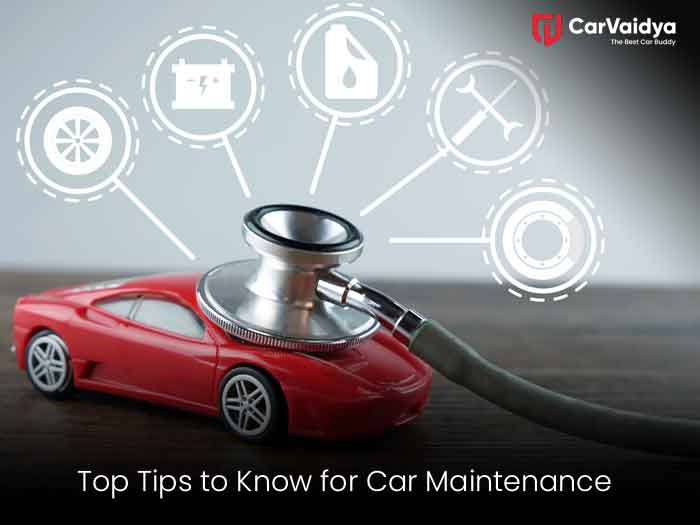5 Must-Know Tips for Every Car Owner


 By CarVaidya
By CarVaidyaOwning a car comes with a plethora of responsibilities and potential challenges. Whether you're a new car owner or have been driving for years, understanding basic car maintenance and operations is crucial for your safety, the longevity of your vehicle, and your wallet. In this guide, we'll explore five fundamental things that every car owner should know.
Regular maintenance is vital for keeping your car in optimal condition. Here are some key maintenance tasks and checks you should perform regularly:
Oil Changes: Engine oil lubricates moving parts, reducing friction and preventing wear. Check your owner's manual for the recommended oil change interval and adhere to it diligently.
Tire Pressure: Proper tire pressure ensures safe handling, improves fuel efficiency, and extends tire life. Invest in a reliable tire pressure gauge and check your tire pressure at least once a month.
Fluid Levels: Check your car's fluid levels, including coolant, brake fluid, transmission fluid, and power steering fluid, regularly. Low fluid levels can lead to serious mechanical issues.
Brake Inspection: Your brakes are critical for safety. Regularly inspect your brake pads, rotors, and brake fluid levels. Replace worn brake pads promptly to prevent damage to the braking system.
Battery Health: Check your battery regularly for corrosion and ensure it's securely mounted. Consider testing your battery's voltage periodically, especially before long trips.
Air Filter: A clean air filter improves engine performance and fuel efficiency. Check your air filter regularly and replace it as needed.
By staying on top of these maintenance tasks, you can prevent costly repairs and ensure your car runs smoothly for years to come.
Modern vehicles are equipped with a variety of warning lights and indicators that alert you to potential issues or malfunctions. Familiarize yourself with the most common warning lights, including:
Check Engine Light: Indicates a problem with the engine or emissions system. While some issues may be minor, others require immediate attention from a mechanic.
Oil Pressure Light: Warns of low oil pressure, which can lead to engine damage if ignored. Pull over and turn off the engine immediately if this light comes on.
Brake System Warning Light: Indicates issues with the brake system, such as low brake fluid or brake pad wear. Have your brakes inspected promptly.
Battery Warning Light: Alerts you to a potential charging system issue. If this light comes on while driving, it may indicate a failing alternator or battery.
Tire Pressure Monitoring System (TPMS) Light: Signals low tire pressure in one or more tires. Check your tire pressure and inflate as needed.
Understanding these warning lights can help you address problems early, preventing further damage and ensuring your safety on the road.
While you may not be a trained mechanic, having some basic knowledge of car repairs and emergency procedures can be invaluable in certain situations. Here are a few essential skills every car owner should have:
Changing a Flat Tire: Knowing how to change a flat tire is essential for every driver. Familiarize yourself with the process and keep a spare tire, jack, and lug wrench in your vehicle.
Jump-Starting a Battery: If your battery dies, knowing how to jump-start your car can get you back on the road quickly. Keep jumper cables in your trunk and learn the correct procedure for jump-starting a vehicle.
Replacing Fuses: Electrical issues can often be traced back to a blown fuse. Learn how to locate and replace blown fuses in your car's fuse box.
Checking and Topping Up Fluids: In addition to regular fluid checks, knowing how to top up essential fluids like oil, coolant, and windshield washer fluid can prevent breakdowns.
By mastering these basic repairs and procedures, you can handle minor emergencies with confidence and avoid costly tow truck bills.
Your driving habits can have a significant impact on your car's performance, fuel efficiency, and longevity. Here are some tips for practicing proper driving techniques:
Smooth Acceleration and Braking: Avoid aggressive acceleration and braking, as these behaviors can increase fuel consumption and wear on your brakes and tires.
Maintain a Safe Following Distance: Keep a safe distance between your car and the vehicle in front of you to allow for adequate stopping time in case of emergencies.
Avoid Revving the Engine: Revving the engine excessively can cause unnecessary wear and tear. Allow the engine to warm up before driving off, especially in cold weather.
Use Turn Signals and Mirrors: Signaling your intentions and checking your mirrors regularly helps prevent accidents and promotes safer driving habits.
Observe Speed Limits: Speeding not only increases the risk of accidents but also reduces fuel efficiency and puts extra strain on your car's engine and components.
By adopting these driving habits, you can prolong the life of your vehicle, save money on fuel, and contribute to safer roads for everyone.
No matter how well-maintained your car is, emergencies can still occur. Being prepared for unexpected situations can help you stay safe and minimize disruptions. Here's what you should have in your car emergency kit:
First Aid Kit: Include basic medical supplies such as bandages, antiseptic wipes, pain relievers, and emergency contact information.
Emergency Supplies: Pack essentials like a flashlight, batteries, a multipurpose tool, duct tape, and a reflective warning triangle or roadside flares.
Non-Perishable Food and Water: Keep a supply of bottled water and non-perishable snacks in your car in case you're stranded for an extended period.
Blankets and Warm Clothing: In colder climates, blankets, gloves, hats, and extra layers of clothing can provide warmth if you're stuck in your car during inclement weather.
Emergency Contact Information: Store important phone numbers, including roadside assistance, in your phone or a physical emergency contact list in your glove compartment.
By assembling an emergency kit and keeping it in your car at all times, you'll be better prepared to handle unexpected situations on the road.
In conclusion, possessing basic car knowledge is essential for every car owner. By understanding regular maintenance tasks, interpreting warning lights, mastering basic repairs and emergency procedures, practicing proper driving techniques, and maintaining emergency preparedness, you can ensure your safety, prolong the life of your vehicle, and minimize unexpected expenses. Make a commitment to regularly review and improve your car knowledge to become a more confident and responsible driver.
Tips to keep your car in top shape during cold weather


0 Comments